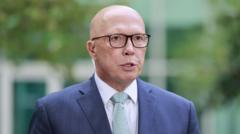In a significant political shift, Australia's opposition leader Peter Dutton has renounced an election pledge to eliminate work-from-home options for public servants. After facing considerable backlash, Dutton acknowledged the error and apologized for the initial proposal, which was intended to accompany job cuts in the public sector. Critics swiftly condemned the plan for its potential to disproportionately affect women, leading to its swift reassessment.
Australia's Opposition Leader Abandons Controversial Work-from-Home Ban

Australia's Opposition Leader Abandons Controversial Work-from-Home Ban
Peter Dutton apologizes for abandoning plans to end remote work for public servants amid backlash from voters.
In response to the backlash, Dutton revealed the Coalition's new stance, clarifying that no changes will be made to flexible working arrangements. He attributed the misinterpretation of the policy to a smear campaign by the current Labor government. Shadow finance minister Jane Hume reiterated this new position, acknowledging the importance of flexible work in optimizing workforce performance.
While the Coalition had previously suggested cutting 41,000 public service jobs to fund policy initiatives, Hume emphasized that reductions would be pursued through a hiring freeze and natural attrition, distancing the party from suggestions of forced layoffs. However, Dutton contradicted her remarks, insisting on the need for policy correction.
The Labor government quickly exploited the shift in policy, mocking Dutton's inconsistency. Employment Minister Murray Watt remarked that Dutton's changing statements are futile against his unchanging reputation. In Australia, workplace flexibility remains a vital concern for voters, overshadowing other political agendas, particularly in the wake of ongoing economic challenges.
While the Coalition had previously suggested cutting 41,000 public service jobs to fund policy initiatives, Hume emphasized that reductions would be pursued through a hiring freeze and natural attrition, distancing the party from suggestions of forced layoffs. However, Dutton contradicted her remarks, insisting on the need for policy correction.
The Labor government quickly exploited the shift in policy, mocking Dutton's inconsistency. Employment Minister Murray Watt remarked that Dutton's changing statements are futile against his unchanging reputation. In Australia, workplace flexibility remains a vital concern for voters, overshadowing other political agendas, particularly in the wake of ongoing economic challenges.




















